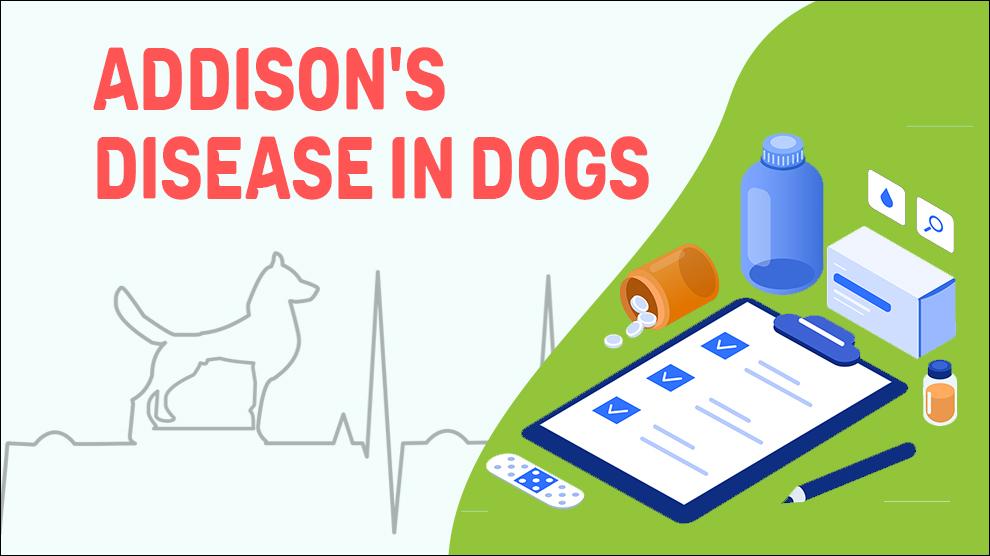What is Addison's Disease In Dogs?
Addison's disease (hypoadrenocorticism) is an autoimmune disorder caused by deficient production from the outer part or cortex of the adrenal gland resulting in the lack of glucocorticoids, mineralocorticoids, or both.
There are two types of Addison's disease, referred to as primary and secondary Addison's disease.
Primary Addison’s disease: dog’s own autoimmune response destroying functions of its adrenal gland.
Typical type of Primary Addison's disease:
- Lack of glucocorticoids and mineralocorticoids.
- Result of your dog’s own immune-mediated destruction of adrenal cortical tissue.
- Why this happens is unknown (idiopathic).
Atypical type of Primary Addison's disease:
- This is called as "the great imitator" in veterinary medicine
- The stereotypical Addisonian patient loses function of the entire adrenal cortex, whereas the atypical case spare the glomerulosa layer and only portions of the zones are affected, resulting in diverse clinical presentations.
- The most common atypical form is Glucocorticoid deficient-only hypoadrenocorticism.
Secondary Addison's disease:
- This condition generate from issues originating from other regions such as a tumor, in the pituitary gland or central (anterior pituitary) deficiency of ACTH.
- This condition can also develop with sudden interruption of long-term exogenous administration of progesterone analogs or corticosteroids.
Symptoms Of Addison's Disease In Dogs
Symptoms may include:
- Dehydration and hemoconcentration
- Emesis
- Eosinophilia
- Anorexia
- Diarrhea
- Weakness, hypotension and microcardia
- Poor appetite
- Hypoglycemia
- Weight loss
- Dehydration
- Excessive thirst
- Increased urination
- Hypocholesterolemia
- Hyperkalemia or a low sodium/potassium ratio
- Peripheral vasoconstriction
- Poor perfusion (feet is colder with a normal core body temperature)
Treatment Options For Addison's Disease In Dogs
- This can be diagnosed on the basis of a compatible history, clinical signs, laboratory abnormalities (GI Abnormalities, Na/K Ratio Renal Abnormalities), Diagnostic Imaging and ACTH stimulation test results.
- There is no outright cure for Addison's disease in dogs; nevertheless, the condition can be managed with proper hormone replacement therapy.
- Dogs may need Long term, treatment through drug therapy to replace the hormones- Mineralocorticoid replacement: fludrocortisone acetate (Bristol-Myers Squibb Company- Florinef) or desoxycorticosterone pivalate (DOCP). The cheaper option is DOCP (Novartis, Percorten-V) Glucocorticoid replacement: Oral prednisone or prednisolone
- Regular blood tests required to check hormone and electrolyte levels
Home Remedies For Addison's Disease In Dogs
- Hypoadrenocorticism has a good prognosis with thorough monitoring by the owner and appropriate medication (Wingfield and Raffe, 2002).
- Some pet owners may not be able to afford the medication expenses and may elect euthanasia, as therapy is ongoing and dosage may need to be altered throughout the pet's lifetime.
- Hectic situations such as traveling, boarding or emergencies may need some medications, such as cortisol, to be increased.
Prevention Of Addison's Disease In Dogs
- There is no means of preventing or avoiding Addison's disease save genetic counseling
- Never skip check-ups.
- Feed a home-prepared diet of pasture-fed, organically produced ingredients
- When your dog is prescribed prednisone dosage, taper off slowly or else you might experience prednisone withdrawal symptoms resulting in Addison’s disease.
- Addisonian crisis ( sudden weakness, hypovolemic shock: severe vomiting and bradycardia, and sometimes collapse) can be prevented
Dog Breeds Affected by Addison's Disease
West Highland White Terrier, Rottweiler, Leonberger, Labrador Retriever, Standard Poodle, West Highland White Terrier, Great Dane, Bearded Collie, Portuguese Water Dog, Nova Scotia Duck Tolling Retriever, Soft Coated Wheaten Terrier, Young to middle aged female dogs
Additional Facts Of Addison's Disease In Dogs
- The cause of primary adrenocortical failure is mostly from an autoimmune response. Other causes include hemorrhage, infarction, destruction of the adrenal gland by granulomatous disease, metastatic tumor, agents (mitotane) or adrenal enzyme inhibitors (trilostane).
- Isolated glucocorticoid insufficiency is more commonly seen in older dogs with lethargy, hypoglycemia, weight loss, normal electrolyte concentrations, hypocholesterolemia and hypoalbuminemia..
- Primary hypoadrenocorticism - young to middle-aged female dogs Atypical hypoadrenocorticism - older dogs
- North Carolina State University research suggest that the disease is heritable in certain breeds
When To See A Vet For Addison's Disease?
For a condition like Addisons disease, don’t skip regular vet visits, your dog’s yearly veterinary check up is not something to be missed.
Once dogs are well regulated, evaluate them at least 2 times each year, with routine bloodwork and a physical examination.
Food Suggestions For Addison's Disease
- Brown rice
- Lean protein sources
- Beef without fat
- Turkey breast
- Carrots, broccoli, green beans
- Apples and watermelon
- Pumpkin, sweet potatoes, bananas, blueberries
- Air-popped popcorn
Conclusion
Canine hypoadrenocorticism is often referred to as the great imitator as it presents with nondescript signs and rarely pathognomonic. Although it is uncommon in dogs, pet owners should consider the diagnosis with the proper signalment and clinical signs. Identification and proper treatment can be highly successful, often long-term, and results in an excellent longterm prognosis.

















